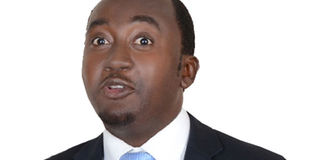Age limit amendment: Why it would be bad and ugly idea

Mr Kaheru, Coordinator, Citizens’ Coalition for Electoral Democracy in Uganda.
The recent move by government to gazette a Constitution (Amendment) Bill, 2017 has prompted a fiery debate specifically on the potential of amending of Article 102(b) of the 1995 Constitution to remove the 75 years age-limit for one to run for presidency. In Uganda’s circumstance, if such an amendment was made, it would inadvertently mean that as a country, we would now be hurtling towards establishing a life presidency.
Within the current political context, amending the Constitution to eliminate the upper age limit for presidential candidates would only mean seeking to safeguard just an individual in power. Not only is it morally wrong to legislate for a single individual, it places our fragile democratic path on the edge of a cliff.
In fact, it borders on the personalisation not only of the Constitution, but also the State. Limitations on the tenure and age were inserted in the 1995 Constitution as safety valves to guarantee organised transition at presidential level – especially given the history that Uganda has never enjoyed a smooth transition from one leader to another since independence in 1962. In 2005, Parliament unfortunately voted for the removal of one of those safe guards – presidential term limits. Twelve years later, there is widespread speculation of a possible injudicious manoeuvre to remove the age limit cap for presidential candidates – when the Constitution is reviewed.
President Museveni will be above the current constitutional 75-year age-limit for one to run for presidency in 2021 when Uganda goes to the polls. The timing and vibes around the amendment(s) could be interpreted as attempts to remove any legal hurdles that would deter Mr Museveni (as an individual who will be above 75 years) from running for presidency in 2021.
A research conducted by the Citizens’ Coalition for Electoral Democracy in Uganda and the National Democratic Institute at the end of last year, indicated that 73 per cent of MPs in the 10th Parliament would not support a constitutional amendment eliminating the age limit for presidential candidates. This goes to show that any machinations to amend Article 102(b) of the Constitution will most likely attract a firm and coherent opposition stance from various quotas, including citizens.
As citizens, we will not continue lamenting and crying betrayal at nonchalant compromises. We are determined to inspire an inclusive and logical debate on the question of age limitations for presidential candidates in Uganda. All Ugandans must have a say. And as we stimulate that discourse, we will do so, mindful of our history, our current malaise and the future that would be good for our country. As a starter, we will tell our respective Members of Parliament what we (as their constituency members) expect of them should the age-limit Bill be among the amendments to be considered by the house.
In Uganda’s current context, the proposal to lift the age limit for presidential candidates will undoubtedly draw the line between the struggle for citizen-responsive democratic leadership and the potentials of imperial life presidency. As citizens, we take matters that touch on our Constitution very seriously and we will certainly deal with such political innuendos with the profound pressure and rigour required. While citizens remain extremely worried and concerned about the course of their country’s democratic path, I sense a renewed sway of duty among the wanainchi to stage a valiant fight for what is right against what is wrong. Citizens seem committed to be vigilant against the imperial and life presidency mindset that is seeking to drive from the corners. Of course, this tendency must be exposed and fought. There is no doubt that moves to remove the upper limit of the presidential age cap are cynical and will further compromise rather than strengthen the Constitution.
Uganda has seen countless political coups. The time is now to sacrifice everything to stop yet another looming “constitutional coup” – through peaceful, organised and effective citizen democratic pressure. This time round, citizens are determined to vehemently resist a reversal of the outcome of a very expensive and painful 1995 Constitution-making process. The energy to struggle against democratic reversals is palpable; the passion to contest elements that impede peaceful democratic leadership transition is profound. We can make it happen.
Mr Kaheru, Coordinator, Citizens’ Coalition for Electoral Democracy in Uganda (CCEDU)
[email protected]




